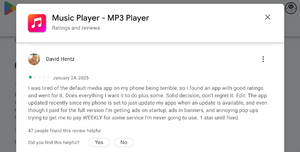Red Sky Labs Muzio Player Premium post-purchase terms change

Red Sky Labs acquired the Muzio Player android app and invalidated previously sold "lifetime" ad-free memberships, using a software update in January 2025 that forced users into a new subscription model.
Overview[edit | edit source]
Since at least May 2020, the previous developer Apps10X[1] sold "Lifetime pro membership" packages for their Muzio Player app, advertising permanent removal of advertisements for a one-time payment. After Red Sky Labs acquired the app, they published an update in January 2025 that retroactively invalidated these purchases by reintroducing advertisements to users and requiring a subscription for ad-free functionality.[2]
Details of the change[edit | edit source]
Prior to January 2025:
- A one-time purchase permanently removed ads
- The app worked offline with minimal internet requirements
- User data was stored locally with an optional cloud backup
- No subscription model was required
After the January 2025 update:
- Previously paid lifetime memberships were no longer honored[3]
- Multiple ads played before music playback[4]
- A forced-subscription model was introduced
- No refund options were available for previous purchasers
Consumer Impact[edit | edit source]
The change hurt users in many ways:
- Previous purchasers lost functionality they paid for
- Customer support emails about the change went unanswered[5]
- Users report getting advertisements even with active subscriptions[6]
- Playlists and user data affected by update[7]
Systemic nature: changing the terms of the sale[edit | edit source]
This shows a pattern of modern consumer exploitation through several issues:
- Using software updates to modify previously purchased features
- Converting one-time purchases into recurring subscriptions without customer consent
- No communication or recourse provided for affected customers
- Many users report identical issues across review platforms[8]
References[edit | edit source]
- ↑ Archived version of the Google Play listing in the Internet Archive
- ↑ Google Play Store, January 25, 2025, LACKY BRACKY review: "The ad removal used to be a one-time purchase, a too-high $10, but now it's an infinitely expensive subscription."
- ↑ Google Play Store, January 23, 2025, Robert Hawley review: "Used to love this music player. I used it every day for years. Free, simple, cool features, and most importantly: no obnoxious ads. Suddenly it started bombarding me with ads unless I pay."
- ↑ Google Play Store, January 25, 2025, Chris Wells review: "Three interruptions just to access my music - First, there's an ad to close, followed by another promotion for their offers, & yet another ad to close."
- ↑ Email documentation from affected customer to Muzio Player support: "Hello! I've been getting ads, Is this a bug? are others also experiencing this? I'm willing to provide app logs and my purchase receipt if this was a bug"
- ↑ Google Play Store, January 23, 2025, Kyle Sargent review: "Even when you spend money, you still get ads. You can't restore your account because the link does nothing."
- ↑ Google Play Store, January 23, 2025, Kyle Sargent review: "It erases playlists randomly. It plays ads with sound, over your music."
- ↑ Google Play Store, January 26, 2025, Jessie Jn Baptiste review: "As of 2025, ads appear when I open the app or try to go back to the app after having it open the background. At times, i need to exit the app to get back in without ads when I first open it."
Babyboy226 (talk) 17:08, 6 April 2025 (UTC)
